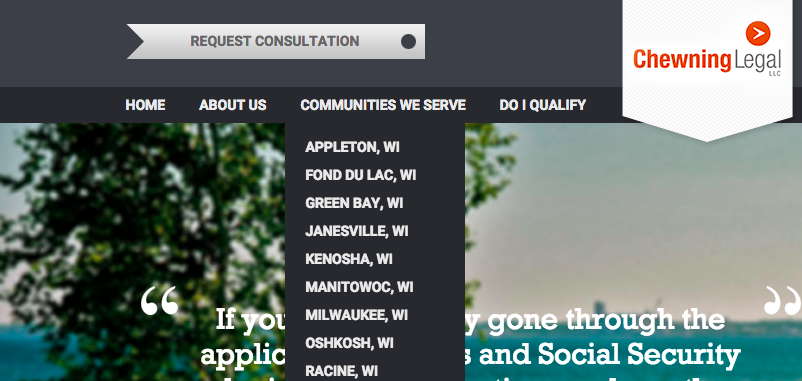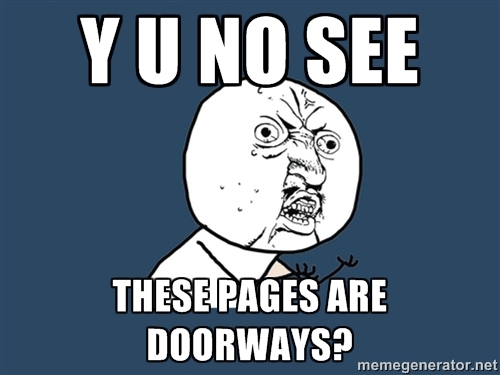
This is an old question. In fact, during my research for this blog, I found people asking this question all the back in 2009 (which is 150 years ago in Internet time). But with the new guidelines Google released on March 16th, it seems interest in this question has surfaced again.
You say Doorway, I say…
It should be a simple question: Do local landing pages match what Google defines as a doorway page? Well… it’s not that easy. Here’s Google definition taken straight from their guidelines:
Doorways are sites or pages created to rank highly for specific search queries. They are bad for users because they can lead to multiple similar pages in user search results, where each result ends up taking the user to essentially the same destination. They can also lead users to intermediate pages that are not as useful as the final destination.
Case closed, right? Local landing pages are meant to rank highly for specific search queries. If I’m an attorney in Los Angeles and I want business from Hollywood, I build a page to target Hollywood and hope that it ranks.
Might as well get rid of any extra market pages you have on your site because Google doesn’t think you have anything to offer to those people.
Now Just Hold Your Horses For A Minute
If it was really that cut and dry, why would Google themselves release an update to their definition? That seems crazy for something so easy to understand. I mean my 4 year old would be able to connect those dots together.

The problem is in the example I gave about the attorney. Does an attorney, who can actually practice law in an entire state, if so desired (or nation wide in some cases), really have to limit which keywords they go after to just where their office is? No, they don’t.
Google’s update clarified things a bit. They gave us questions to ask in order to diagnosis whether or not our landing pages are truly considered a doorway page.
So let’s put a local landing page to the test. Here’s a great example page:
https://chewninglegal.com/appleton-social-security-disability-attorney/
Let’s Play “Ready, Set, Penalize”
The rules are simple: Answer the questions honestly. Losers go out of business. Winners get another penalty to worry about.
Question 1: Is the purpose to optimize for search engines and funnel visitors into the actual usable or relevant portion of your site, or are they an integral part of your site’s user experience?
Is this page optimized for search engines? Yes, of course. It would be crazy to say that any page trying to abide by Google’s guideline isn’t optimized for search engines.
Is it an integral part of the user experience? Yes. It doesn’t funnel any visitors to any specific page (other than maybe the contact page, but you could say that of any page on the site).
If someone in Appleton is looking for a disability attorney, is it important to them, integral to their experience even, that they know this attorney offers service in their city? Yes. It helps them see they aren’t wasting their time on a website that doesn’t offer what they need.
Question 2: Are the pages intended to rank on generic terms yet the content presented on the page is very specific?
Ranking for Appleton Disability Attorney, with content that supports the topic, doesn’t seem very generic. This page is trying to market to a very specific person both in what it ranks for and in what it presents.
Question 3: Do the pages duplicate useful aggregations of items (locations, products, etc.) that already exist on the site for the purpose of capturing more search traffic?
This one is tricky but it is the use of the term “aggregations” that really tells us what they are looking for. In the case of the page we are using, the answer is no.
We are not duplicating items that already exist on the site. There isn’t another page targeting Appleton Social Security Disability Attorney anywhere on the site. This is the one page going after a specific market. Will this page show up for Wisconsin? Not likely. Is this page’s sole purpose to get more search traffic from Wisconsin specific terms? Nope.
Question 4: Are these pages made solely for drawing affiliate traffic and sending users along without creating unique value in content or functionality?
Again, I go back to the point of the page. The unique value of this page is that it speaks to a very specific customer, the person injured in Appleton.
Let’s break from our example for a second to put this in a more relatable example. I want to buy a new dishwasher. Since I live in a smaller town, I want to find a company that will deliver and provide maintenance in case anything breaks down.
I find the dishwasher I want, their site says they service my city, and everything is happy happy.

Come find out, they just listed the city on their site because they wanted to get people to order from them. They don’t deliver, they don’t provide maintenance, nothing. Luckily, I double-checked before I bought anything but I’ve wasted my time.
Compare that to a company that has a page specifically for my city that clearly states what they offer, what their terms are, and answers all of my questions.
Which one was sending me along? Which one was offering unique value?
Having landing pages clearly state what you offer in a market is a unique value.
This is the easiest question to answer. When done properly, local landing pages should be easy to find, via your main navigation as in our lawyer example, in your footer, or even on your contact page.
Look at the main navigation on our example website:

They are linking to their local landing pages from every single page on the website. They are easy to find, easy to navigate to.
Are these links created just for search engines? No. The point is to help users determine whether or not you cover their city.
Ok, ok, I concede that you could accomplish the same thing with just a note saying “we service the following cities”.

However, having the page built specifically for those markets allows you to target specific personas.
Someone in Appleton has a different situation then someone in OshKosh. If you have a well-developed content strategy, you’ll want to target those different personas with different pages that speak to their needs.
But Wait, There’s More
I did a lot of research on this topic. When I started I thought landing pages would be considered doorway pages, based on the definition Google gave.

I’ve changed my mind. Local Landing pages, in my opinion, are exactly what Google wants to rank in their search engine.
Wait, what?
Look at this part of the updated definition Google provided: “They can also lead users to intermediate pages that are not as useful as the final destination.”
Look at that local landing page again. Is it not the final destination for someone in Appleton? Can they not contact the attorney directly from that page? Do they need to visit any other page on the site in order to get the information they need?
You get the point.
Google is all about providing the best experience to their users. They want them to find their answers quickly and effectively. That is the whole point of local landing page. We want to provide our users in each of our markets with information that is unique and valuable to them.
Does this tactic get abused? Of course it does. I would even go so far as to say that Google begged for it to be abused with the changes they made with Pigeon. By making the local algorithm more in line with the organic one, they were asking for people to spam pages for sub-markets so they could rank for markets they were interested in.

Does all of this mean that local landing pages won’t be penalized? Not in the slightest. Any tactic that proves successful at getting people more traffic (read: better rankings) will be abused with low quality mass scale content (Guest Blogging, I’m looking at you).
But will your site be penalized? If you are truly offering a unique experience to your user by providing information specific to their market, I believe you are on the safe side of this update.
And if your not? If you have duplicate content across every zip code, city, and individual address in your multiple markets, I’m not sure how to sugar coat this, you need to make some changes in your marketing plan.